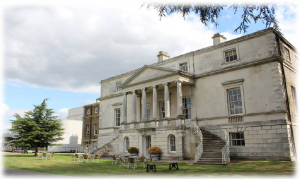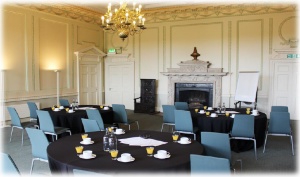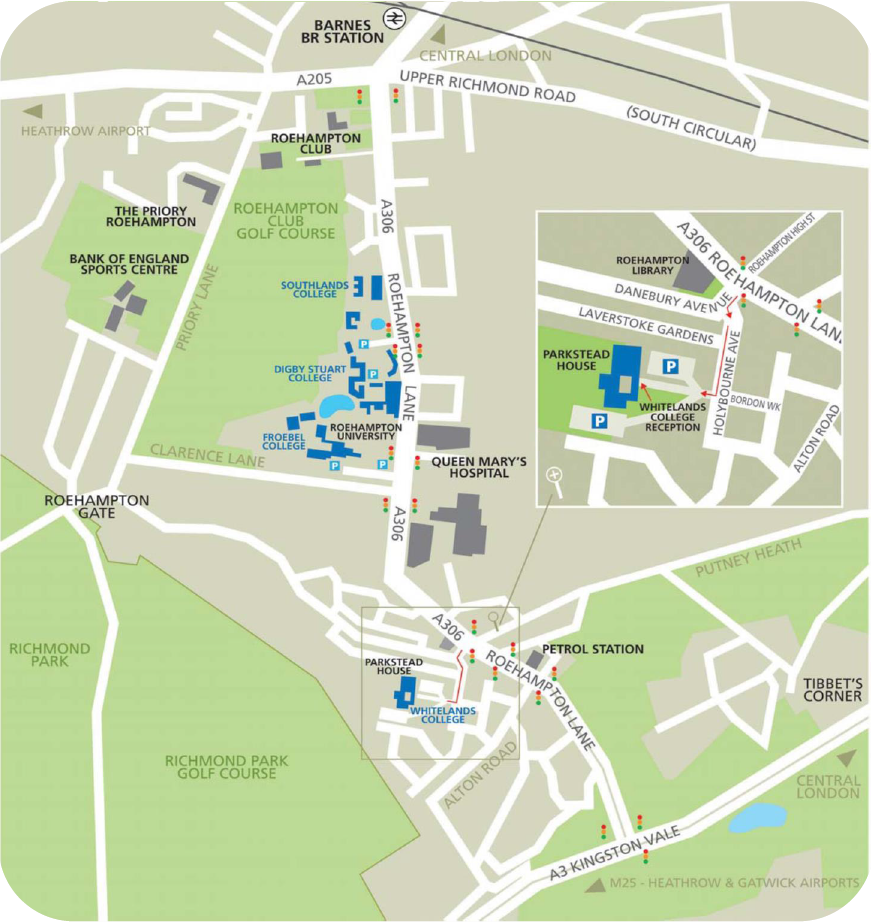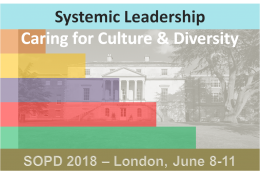
Generative conferencing - development, learning and sharing of systemic leadership and consulting practice.
From 9:00 until 18:00
At Roehampton University, London UK
Parkstead House, Roehampton, London, SW15 4JD
£580 (Early bird £500 for registrations by April 15th 2018)
We are inviting you to join this four day collaborative event which will be focused on development, learning and sharing of systemic organisational practice, with inputs from key note speakers and participants. The key topic of this year’s Dialogues is Systemic Leadership - Caring for Culture and Diversity.
This is a space for leaders, consultants, clinicians, practitioners to share and develop their organisational leadership and consulting practice, contributing to their organisation and to client systems. The programme includes multiple exchanges, key note inputs, participant presentations, plenary dialogues and group performances. Speakers include Rachel Watson (Cambridgeshire County Council), Prof Kevin Barge (Texas A&M University), Christine Oliver and Martin Miksits (The Systemic Development Partnership).
Further details on the programme and speakers are included in the programme below.
- about practice dialogues
- the programme
- your invitation to contribute
- speakers
- conference venue and directions
- accommodation
- registration and fee
About practice dialogues
With the conference format of practice dialogues we are aiming to engage practitioners such as organisation development consultants, executive coaches, organisational leaders, managers, clinicians, social workers, researchers, religious and community leaders, who are interested in the application of systemic and social constructionist practice in relation to organisational emergence. Participants are invited to take an interest in learning from each other’s practice as well as from planned workshops.
The format of this four day developmental journey is one of collaborating, co-creating, learning and exchange on multiple levels. Participants will learn in relation to individual aims, plenary discussions and workshops, but also from groups of practitioners with related aims and interests to process and develop learning. These practitioner groups will be invited to share and exchange their work throughout the conference.
The Systemic Organisational Practice Dialogues are a platform to develop your relationships within the community of systemic practitioners and with systemic thinking and practice concepts, and to make concepts and experiences relevant to your practice, your team or your organisation. It is also a place to share your practice with others and to talk about what you are doing, what has been successful and also what you are hoping to develop. There will be space for such dialogical exchanges in plenary sessions and in small group work.
The programme

The programme includes coffee, tea, pastries and a gourmet sandwich lunch served with crisps and fresh fruit and a complimentary conference supper party at Christine Oliver’s house on Sunday evening. The conference dinner on day 1 at a nearby pub is optional and not included with the course fee.
Friday, June 8, 2018 – 9:00 – 18:00
- Introduction, aims, formation of groups
The conference starts with an orientation – to each other, to our individual and collective aims, to how we wish to relate to and achieve specific and emergent outcomes. This includes the formation of small groups of participants who will provide stability for learning, reflecting with and supporting its members over the four day conference.

 Systemic practice and the facilitation of inclusive organisational cultures
Systemic practice and the facilitation of inclusive organisational cultures
Christine Oliver and Martin Miksits
We will share frameworks for understanding inclusion and connect them to systemic social constructionist theory, practice and sensibilities, specifically to CMM theory and imaginative, affirmative practice of organisational development. We will use these ideas to discuss and critique our work with organisations and invite positions of systemic agency in contributing to inclusive practice and culture.
- Practitioner groups working on participant aims and interests
Working in interest groups and reflecting on emergent learning and interests.
- Plenary dialogue on learning from inputs
All participants / groups come together for sharing and reflecting on day 1.
- Conference dinner at pub (optional)
Saturday, June 9, 2018 – 9:00 – 18:00
 Working with power to create inclusive conversations: towards jointly created authority
Working with power to create inclusive conversations: towards jointly created authority
Rachel Watson
Rachel will work with us to explore the impact of power on how culture and diversity are ‘looked after’, and how contexts for useful conversations can be created. She will introduce the concept of Jointly Created Authority from Conversational Analysis literature, showing how examining the minutiae of talk can invite understanding of how power operates at different levels. Using examples from her recent research on work in a social care context, concepts from systemic practice will be explored that can influence how issues of power can be named and managed, and these are relevant to any setting where conversations take place between people.
- Participant inputs - speakers to be announced
Participants offer short presentations and workshops in relation to the topic of ‘Organisational Dialogue and Design – Systemic Leadership amidst Chaos and Adversity’- you are welcome to register your interest to contribute in this way!
- N
 europsychoanalysis and Reflexivity in Systemic Leadership
europsychoanalysis and Reflexivity in Systemic Leadership
Alexandra Garcia Rosales
Alexandra will explore the relevant neuropsychoanalytical underpinnings of mentalization, anxiety and attachment and their connection to systemic concepts such as reflectivity and relational reflexivity. Participants will be invited to have an inclusive “both and” position in terms of body and mind integrating concepts from both neuropsychoanalytical and systemic frameworks. Participants will be invited to explore how this knowledge can be translated into action as well as its relevance to the development of organisational cultures.  Systemic Sensibilities in leading a Culturally Competent Workforce
Systemic Sensibilities in leading a Culturally Competent Workforce
Chris Murray
Chris will cover and explain the concept of a LB Hackney Cultural Competence Framework (T.Cross 1989) to have a highly functioning, community sensitive Children’s Workforce. It will also include group exercises to stimulate discussions and provoke thoughts linked to the above.
- Practitioner groups working on participant aims and interests
There will be time in the morning and afternoon for practitioner groups to reflect on learnings and develop thinking in relation to participant aims and group purpose.
- Plenary dialogue on learning from inputs
All participants / groups come together for sharing and reflecting on day 2.
- No formal evening programme
Sunday, June 10, 2018 – 9:00 – 18:00
-
 Fostering Inclusive Leadership and Excellence
Fostering Inclusive Leadership and Excellence
Kevin BargeContemporary leaders are increasingly called to manage diversity and culture within their organizations. This workshop will focus on the concepts of inclusive leadership and excellence. What does it mean to create inclusive leadership practices that constructively manage issues and opportunities regarding diversity and culture? What does the notion of inclusive excellence mean and how does it extend our current understanding of organizational excellence? What paradoxes, tensions, and dilemmas do leaders engage when fostering inclusion and caring within organizations? How can leadership address the structural and conversational dynamics that facilitate the co-creation of organizational cultures that honor diversity and difference? Drawing on current thinking in dialogical approaches to leadership, we will explore how framing, narrative, and storytelling practices can facilitate the co-creation of inclusive cultures that engage issues of diversity and difference in a caring and generative manner.
- Caring for Culture and Diversity - Participant Inputs
Participants offer short presentations and workshops in relation to the topic of ‘Organisational Dialogue and Design – Systemic Leadership amidst Chaos and Adversity’- you are welcome to register your interest to contribute in this way!  Organisations merge - about cultural fusion, mutual appreciation and the new narrative
Organisations merge - about cultural fusion, mutual appreciation and the new narrative
Olli-Pekka Juoperi
This is a case of two banks, which merged. As consultant to the organisation I conducted interviews and a short series of workshops with the wider management team. Throughout the process I used our (Humap) digital platform, especially with metaphors and storytelling. In this input I will share my ideas about this work and showcase the tools that I used.
-
Values-led practice: the story of a collaborative workshop exploring shared values within an NHS partnership
Ali HassasPublishing mission statements and organisational values seem de rigueur in modern day professional institutions, yet the stories told by managers & leaders about culture and values seldom seem aligned with the stories lived by the organisation or the people within it.
In this session I will briefly tell the story of a General Practice partnership in South West London engaging in thought and conversation around their organisation’s culture and considering what being values-led might look like as a practice. I will outline work undertaken aimed at identifying a set of commonly shared values in the context of the partnership and how that informed the task in relation to the organisation.
Participants will then be invited to use the approach to identify their own core values and consider how these relate to their own professional context when thinking about culture & diversity.
- Practitioner groups working on participant aims and interests
There will be time in the morning and afternoon for practitioner groups to reflect on learnings and develop thinking in relation to participant aims and group purpose.
- Plenary dialogue on learning from inputs
All participants / groups come together for sharing and reflecting on day 3.
- Course supper party at Christine Oliver’s house (complimentary)
Monday, June 11, 2018 – 9:00 – 15:00
- Caring for Culture and Diversity,
Participant inputs
Tall, white and male; narratives of entitlement and loss of entitlement in leadership practice
Percy Aggett
In this workshop I would like to explore the notion of entitlement-its utility and subjectivity, and how it connects with equality issues in the performance of leadership. Micro-interactions between staff at all levels turn on issues of personal confidence, influence, knowingness, and opinion. We will look at participants’ personal learning in this domain of organisational life.
- Practitioner groups – report out, presentations and performances
- Conference reflections
In a final plenary session, participants are invited to share reflections and learnings on what has been created and how individual aims could be achieved or progressed, thus creating another level of integration and learning.
- Closing
Your invitation to contribute
Having joined the Systemic Organisational Practice Dialogues you will find yourself in a position of co-creating the conference and each other’s experience and position in it from day 1. Inviting collaboration in a community of practice we hope that our dialogue and collective inquiry into the topic of caring for culture and diversity will thrive on everybody’s contributions as much as on the resonance from inputs of key note speakers.
You are invited to take an active position in these dialogues and to make a brief contribution – be it on your practice, your research or the challenge you are facing in relation to your organisation and the positions for leadership created in it. We have planned for sessions of an hour for these contributions including some time for reflections and dialogue. If you are interested in leading such an input please contact Christine Oliver and Martin Miksits at dialogues@systemicdevelopment.eu.
Speakers
(more speakers to be announced)
 Percy Aggett: I have lived and worked in East London, UK, for 45 years in social care, and adult acute psychiatry and child mental health. A social worker and systemic psychotherapist by training, I am interested in participative learning, systemic leadership practice and organisational development. I am concerned to create safe, imaginative organisations. I am interested in the different ways in which people learn and how to co-create contexts in which people learn best. I am interested in developing collaborative approaches to agency & team development and how mental health workers can be empowered to stay working with persistence in vulnerable communities.
Percy Aggett: I have lived and worked in East London, UK, for 45 years in social care, and adult acute psychiatry and child mental health. A social worker and systemic psychotherapist by training, I am interested in participative learning, systemic leadership practice and organisational development. I am concerned to create safe, imaginative organisations. I am interested in the different ways in which people learn and how to co-create contexts in which people learn best. I am interested in developing collaborative approaches to agency & team development and how mental health workers can be empowered to stay working with persistence in vulnerable communities.

J. Kevin Barge (PhD) is a Professor and Head of Communication at Texas A & M University. He is also a member of the planning team for the Aspen Conference, a community of engaged organizational communication scholars focused on developing practical theory and collaborative research that bridge academic-practitioner interests.
Kevin’s major research interests center on developing a social constructionist approach to leadership, articulating the connections between appreciative practice and organizational change, as well as exploring the relationship between discourse and public deliberation, specifically practices that facilitate communities working through polarized and polarizing issues. Other research interests include investigating the role of reflexivity in leadership and management practice, examining ways to develop effective academic-practitioner collaborations, and developing practical theory. Kevin’s research is inspired by interpretive and discursive research approaches and he is keenly interested in how collaborative research methods can be used to generate usable knowledge and forward movement in organizations and communities.
He has published articles on leadership, dialogue, and organizational change in The Academy of Management Review, Management Communication Quarterly, Human Relations, Communication Theory, Journal of Applied Communication Research, and Communication Monographs. Kevin has served on a number of national and international editorial boards for journals such as Management Communication Quarterly, Journal of Applied Communication Research, and Human Relations. He is a former editor of Communication Studies.
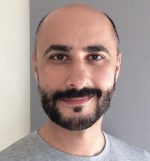
Dr Ali Hassas is a GP Partner, educator, Programme Director at Health Education England, executive coach and a group facilitator.
He has a particular interest in systemic leadership within healthcare, organisational dynamics & how teams function within complexity, uncertainty or stuckness.
As a tutor on the Postgraduate Certificate of teachers in Primary Care, he has helped weave social constructionist ideas into the delivered curriculum and as part of his role at HEE he has been introducing a model of systemic & narrative supervision using a reflecting team for GP educators across South London.
Alongside his clinical and educational roles Ali is also involved with leadership training and organisational consultancy. His current projects include introducing systemic ideas into a struggling Social Care department in South London and internal organisational facilitation and restructuring within a large GP practice of 26,000 patients and 85 team members.
 Chris Murray (MA), Strategic Commissioner for Youth Services – Royal borough of Kensington & Chelsea (RBKC). Chris is JNC trained and holds a Degree in Youth & Community studies, with a MA in Childhood and Youth: Frameworks for Integrated Practice.
Chris Murray (MA), Strategic Commissioner for Youth Services – Royal borough of Kensington & Chelsea (RBKC). Chris is JNC trained and holds a Degree in Youth & Community studies, with a MA in Childhood and Youth: Frameworks for Integrated Practice.
Chris has over 20 years’ experience as a Senior Manager in both local government, commercial (Football Association) and the voluntary sector leading on a range of services for children and young people. He has worked in a variety of Children’s Service roles across London and at County Council level, encompassing early help and youth work, participation, play, sport, health and arts provision. Following 10 years working in Norfolk for Children’s Services, Chris relocated back to London (LB Hackney) and was appointed to the post of Youth Programmes and Projects Manager for Young Hackney since 2013 until more recently (2018).
Chris is now working for RBKC to redesign and restructure the youth service following recent events in West London. Chris has tutored on theintercultural dialogue module at Anglia Ruskin University, London Metropolitan University and University of East London since 2013 as well as an external assessor for Pan–European Youth Programmes and Youth Exchanges which aim to tackle racial discrimination across Europe. He is also a graduate of the Virtual Staff College Network for future Black & Asian Leaders (BALI). Chris is a keen advocate for Systemic Dialogue and how it can improve service design, implementation and communication.

Olli-Pekka Juoperi (M.Ed.), CEO Humap Ltd
Olli-Pekka has a background as a Headmaster and developer of Finnish School system. 1999 he took the step from public sector to business with couple of colleagues. Humap has been a company, which has from its very beginning used digital tools in systemic frame work to make strategic changes in organisations. Nowadays Humap Consultation has 13 consultants and Humap Software 17 employees. https://www.humap.com/en/
 Dr Alexandra Garcia Rosales is a Consultant Child and Adolescent Psychiatrist working for Hertfordshire Partnership University NHS Foundation Trust in the Positive Behaviour Autism Learning Disability Mental Health Service (PALMS). She is an accredited “Conversations Inviting Change” (CIC) supervision skills trainer and has a special interest in reflective practice. She is a proud member of the Brunswick 6 community of practice which was created following CIC training. In addition to that, she carries out active research on Attention Deficit Hyperactivity Disorder (ADHD) under the supervision of Emeritus Professor Eric Taylor and Dr Silia Vitoratou at the IoPPN (King’s College, London) and is currently doing her PhD on ADHD at the Universidad Autónoma de Madrid.
Dr Alexandra Garcia Rosales is a Consultant Child and Adolescent Psychiatrist working for Hertfordshire Partnership University NHS Foundation Trust in the Positive Behaviour Autism Learning Disability Mental Health Service (PALMS). She is an accredited “Conversations Inviting Change” (CIC) supervision skills trainer and has a special interest in reflective practice. She is a proud member of the Brunswick 6 community of practice which was created following CIC training. In addition to that, she carries out active research on Attention Deficit Hyperactivity Disorder (ADHD) under the supervision of Emeritus Professor Eric Taylor and Dr Silia Vitoratou at the IoPPN (King’s College, London) and is currently doing her PhD on ADHD at the Universidad Autónoma de Madrid.
R achel Watson is an experienced Systemic Family Psychotherapist, supervisor, trainer, and manager. She is Lead Clinician for Cambridgeshire Children’s Social Care, responsible for a large team working across services for families including safeguarding, early help, disability services, and adoption and fostering. She has also worked in all areas of child and adolescent mental health services in the NHS, including residential services, and in adult mental health settings.
achel Watson is an experienced Systemic Family Psychotherapist, supervisor, trainer, and manager. She is Lead Clinician for Cambridgeshire Children’s Social Care, responsible for a large team working across services for families including safeguarding, early help, disability services, and adoption and fostering. She has also worked in all areas of child and adolescent mental health services in the NHS, including residential services, and in adult mental health settings.
Rachel’s current areas of interest include working with complex situations where risks are high; and using systemic practice to address issues of power in organisational contexts.

Christine Oliver (PhD) is a significant contributor to systemic practical theory in the field of systemic therapy and systemic organisational practice. She has been developing and leading systemic leadership and organisational development trainings at Masters level for universities and training institutes, recently in collaboration with Martin Miksits. She also works as Consultant Family Therapist and Group Analyst for East London Foundation Trust and is an independent psychotherapist and organisational consultant working to facilitate individual and organisational development.
Christine provides systemic leadership and management training and consultancy for public, private and not for profit organisations locally and globally. A primary interest is in consultancy methodologies for structuring dialogue to engender reflexive practice in the workplace. She has contributed to the development of systemic theory and practice through many published papers and through her most recent books: Reflexive Inquiry, published by Karnac, London (2005) and Complexity, Relationships and Strange Loops, published by the MHA Institute, Canada (2003).
 Martin Miksits (DProf) works as coach and consultant with leaders, teams and organisations. He has taught systemic leadership in University, private and public services contexts, and has co-developed and co-led the MSc in Systemic Leadership and Organisational Development with Christine Oliver. He also works as systemic therapist in private practice.
Martin Miksits (DProf) works as coach and consultant with leaders, teams and organisations. He has taught systemic leadership in University, private and public services contexts, and has co-developed and co-led the MSc in Systemic Leadership and Organisational Development with Christine Oliver. He also works as systemic therapist in private practice.
His consulting experience is with public service and business organisations in facilitating organisational transitions, development and learning, for instance in relation to organisational practice, process, performance, strategy or culture, using systemic, appreciative and collaborative approaches.
Martin draws on twenty years of industry experience working mostly in international management positions. He has been leading major strategic change initiatives in a global company, business development and sales management in Latin America, management of merger and acquisition projects in the Netherlands and in Belgium, cultural change and process change in Austria and in the UK. He has a professional doctorate in Systemic Practice and masters degrees in Business Administration, Systemic Therapy, and Systemic Leadership and Organisational Practice.
Conference Venue
Chambers Suites, Parkstead House, Roehampton, London, SW15 4JD
Parkstead House is situated in Whitelands College of the University of Roehampton, just a five minute bus ride from Barnes mainline station and minutes from the A3. There are also regular bus services from Putney, Wimbledon and Hammersmith which all have underground stations direct to central London. This location is within easy reach of Heathrow airport and has a number of car parking spaces available on site. For directions please refer to the last page of this flyer.
Directions
Location Map – Whitelands College, Parkstead House
Train
The nearest station is Barnes, from which it is about 25 minutes walk to Whitelands Campus, or take buses 72 or 265, which stop outside all campuses. Trains to Barnes run from Clapham Junction, London Waterloo, Staines and Windsor.
Tube
District/ Piccadilly/ Hammersmith & City lines to Hammersmith. From the tube station, go to bus stop K in the Lower Bus Station next to the shopping centre and take bus 72 to all campuses.
District line to Putney Bridge. From outside the tube station, take bus 265 to all campuses.
Bus
Buses that stop nearby: 72, 265, 493, 170, 493. Travelling up Roehampton Lane, alight at the stop just before the junction with Danebury Avenue. Turn right down Danebury Avenue and then take the immediate left onto Holybourne Avenue. Whitelands is a minute’s walk on the right-hand side. If you are travelling from the direction of the A3 alight at the stop just after the junction with Danebury Avenue.
Accommodation
Accommodation available at Roehampton University Campus
It is possible to book rooms in the Elm Grove Centre of the nearby University Campus. These are small doubles with all amenities including ensuite bathroom, iron & ironing board, hair dryer, tea & coffee making facilities and a TV.
Please contact Ben.Phillips@roehampton.ac.uk directly to make a reservation. It is sensible to do this as far in advance as possible to secure university accommodation.
Nearby Bed and Breakfasts
Please contact us if you want a recommendation on nearby bed and breakfasts.
Registration and fee
The fee for the four day Systemic Organisational Practice Dialogues is 580 pounds. This includes coffee, tea, pastries and a gourmet sandwich lunch served with crisps and fresh fruit and the complimentary course supper party at Christine Oliver’s house. For bookings before April 15, 2018, a reduced (early bird) fee of pounds 500 is applicable.
Please register online - for any queries please contact us to dialogues@systemicdevelopment.eu .
